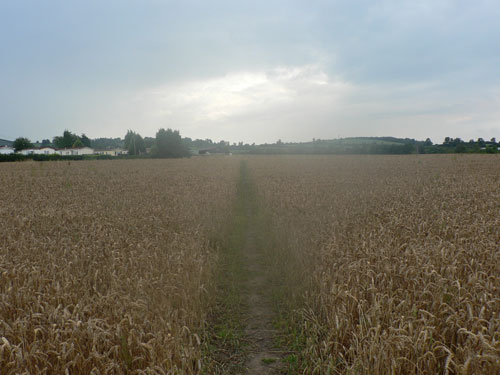15 Ways to Accidentally Damage Your Camera
Most of us try to take good care of our camera, but there are plenty of ways people accidentally damage their photographic equipment. Many of these sound obvious, perhaps it is because they are obvious that they can be easily forgotten or overlooked, and end up in an expensive accident for your camera.
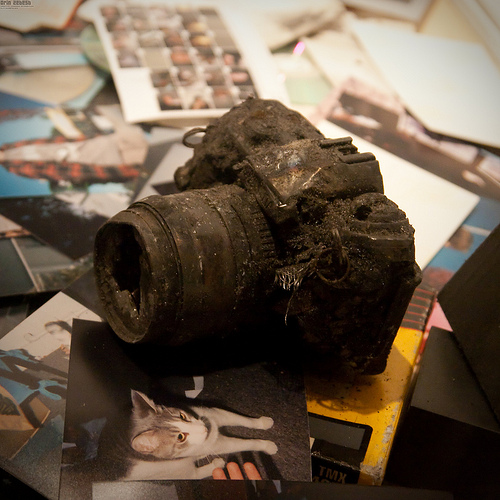
Horror! Camera Carcass by Orin Zebest on flickr (licensed CC-BY)
Don't use a lens cap
Using a lens cap on your lens when not in use helps protect the lens glass from scratches. Particularly important when you put a lens / camera away in a bag, but it can also protect the lens if you accidentally drop the camera.
Don't use a camera strap
Using a camera strap on your camera (and having the strap round your neck) acts like a safety strap. If you do fumble or drop your camera, the camera won't fall to the ground.
Leave your camera strap dangling off the edge of a table
This must be one of the most common ways that cameras get damaged. If you have a strap attached to your camera and leave it hanging over the edge of a surface, someone or something (such as a pet) can easily accidentally catch on the strap and pull the camera off the table, crashing to the ground.
Either use a removable strap, or make sure that the strap is fully on the surface the camera is placed on. (And placing the strap / camera near the edge of a table is asking for trouble too).
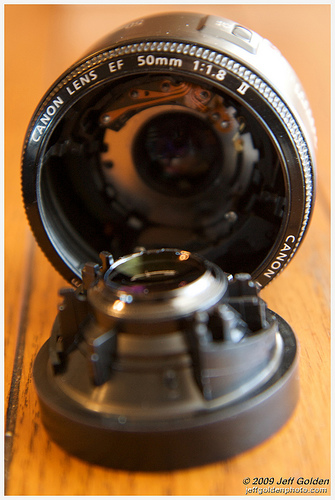
Build Quality - It matters by jeff_golden on flickr (licensed CC-BY-SA)Put it in your pocket and forget about it
If you have a pocket size camera, make sure you remember when you put it in a pocket. You don't want to sit down or lean against a wall and crush your camera to death. Or have it fall out of your pocket while Go-Karting:
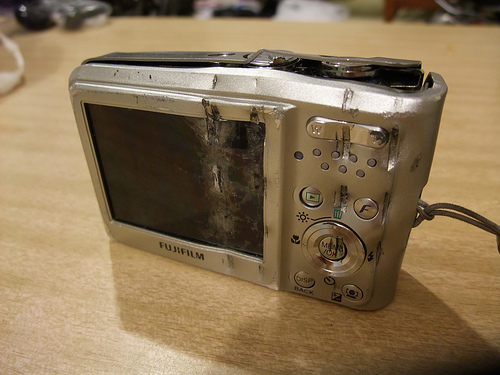
RIP Fuji F31fd by goosmurf on flickr (licensed CC-BY)Use a lightweight tripod in the wind
Using a lightweight tripod without any extra weight attached or sandbags round the legs in the wind can be a recipe for disaster. The tripod can blow over, bringing your camera crashing down with it.
Similarly, if you are using a tripod with the legs sloped at an angle, make sure the tripod is weighted properly so that it won't fall over. Or just make sure you keep one hand on it to keep it steady.
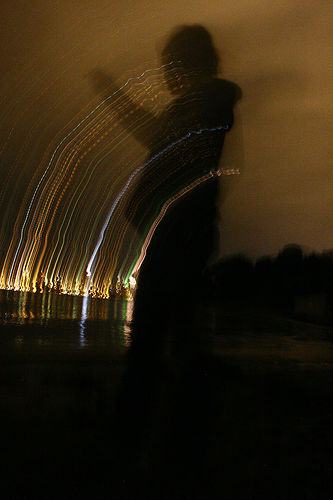
This is My Canon 20d... Falling Off Its Tripod. 🙁 by Kris Krug on flickr (licensed CC-BY-SA)Don't secure your camera to the tripod properly
Make sure the camera is secured to the tripod properly, especially when moving the tripod with the camera attached. Otherwise the camera can fall off and come crashing down.
If you use a quick release system for your camera to allow you to quickly attach and release the camera from the tripod, this is particularly pertinent. If you screw the camera onto the tripod, then is is less likely to be an issue.
Get sticky fingerprints on your lens
Whilst getting fingerprints on your lens is highly unlikely to cause permanent damage, it should still be avoided. Fingerprints on the lens will cause a reduction in contrast, loss of resolution, and induce flare.
Cleaning sticky prints off can be quite tricky and needs to be done carefully to avoid just smudging the mess around.
Clean your lens with your shirt
Okay, so this one won't actually cause any damage in the vast majority of situations. But it is strongly advised to clean your camera's lens with a microfiber cloth designed for lens cleaning.
Using a shirt there is an increased chance of some dirt caught in the shirt scratching the lens surface. And fibers, dust etc. can also come loose from the shirt, leaving you with a lens that isn't any cleaner than before you wiped it.
Don't open your camera bag carefully
This is particularly an issue that affects camera backpacks, but other bags can have the same problem. When you open your bag, make sure you open it slowly and carefully.
Tilt the bag so that the items in the bag are resting against the back / base of the bag, rather than against the flap you are opening. Otherwise when you open the bag your gear falls out and can be damaged.
Leave your bag zips partly undone
After taking something out of / putting something into your bag, make sure you do the zips up fully. If you leave a large gap unzipped, then something will likely fall out of the bag. In my experience, sometimes leaving just a small gap unzipped can be problematic too - the zip seems to slowly come more undone, leaving a bigger gap for items to fall out of.
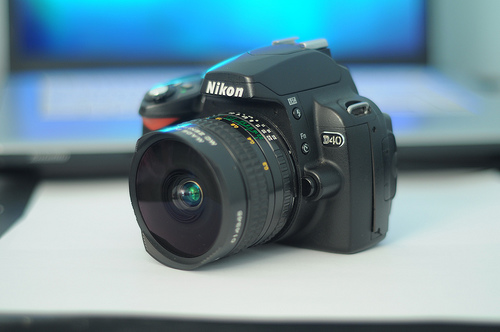
The End of my D40 by soundman1024 on flickr (licensed CC-BY)Use your camera at the beach
While it would be silly to say never take your camera to the beach, you should be aware of the issues of shooting in sandy areas. Sand can get in your tripod legs and cause them to jam up. Similarly, getting sand under the zoom or focus rings of a lens can cause big problems.
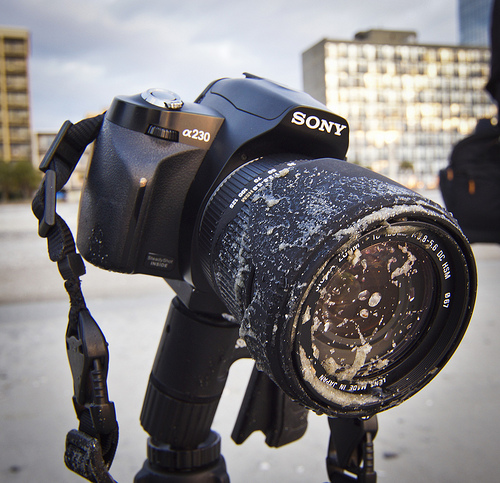
My Sandy Sigma Lens by f_trudeau on flickr (licensed CC-BY)The damp salt air from the sea is not friendly to electronics. It is often quite breezy at the beach, and sand can be blown up in the air as well. If you use an interchangeable lens camera and want to change lenses, be quite careful about it. If you get sea water on your camera, wipe it off with a damp (damped from fresh water) cloth.
Use your camera in heavy rain without a rain sleeve
Most cameras can survive a bit of light rain with no problems, but if you want to use your camera in heavy rain or sustained light rain, you really need a rain cover. Rain getting inside the camera can ruin the electronics and result in a broken camera. Sometimes the camera will come alive again after drying out, sometimes not.
If rain gets into your lens it could leave marks on the lens elements. This might not actually have a noticeable effect on image quality, but I wouldn't fancy on testing it out to see. The electronics of the lens failing from water ingress is a more likely problem though.
Clean your camera sensor with a vacuum cleaner
A household vacuum cleaner might sound like a good idea for cleaning the insides of an interchangeable lens camera. It will just suck all the dust right out of the camera. But it will suck other parts of the camera out as well, which probably wasn't what you intended.
And as a bonus, it will build up a static charge, so that dust will be attracted to the insides of your camera. So not really a good idea at all.
Shooting from slippy rocks
Similar to shooting at the beach, shooting from a rocky shoreline you need to be aware of the risks. Slipping over with your camera can be costly mistake. This can be a problem when photographing from wave breakers or anything else that gets wet / damp a lot as well.
Shooting from the water's edge
When shooting by the sea or a large lake, be careful is placing your tripod (or standing) in or near the water's edge. A strong wave could knock you or your tripod over, resulting in a double-whammy of a dropped and soaked camera.
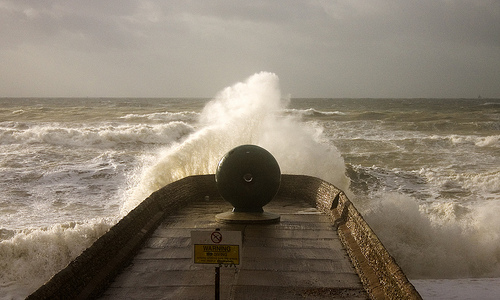
Brighton Storm - 14th November 2009 by Dominic's pics on flickr (licensed CC-BY)
Unfortunately I've had a few of these accidents before. I can tell you first-hand that accidentally smashing up expensive photography equipment (especially while on holiday) is not fun.
Have you had any accidents with your camera or know of any other types of accidents people have had with their cameras or other photography equipment? Feel free to share your stories in the comments below.
